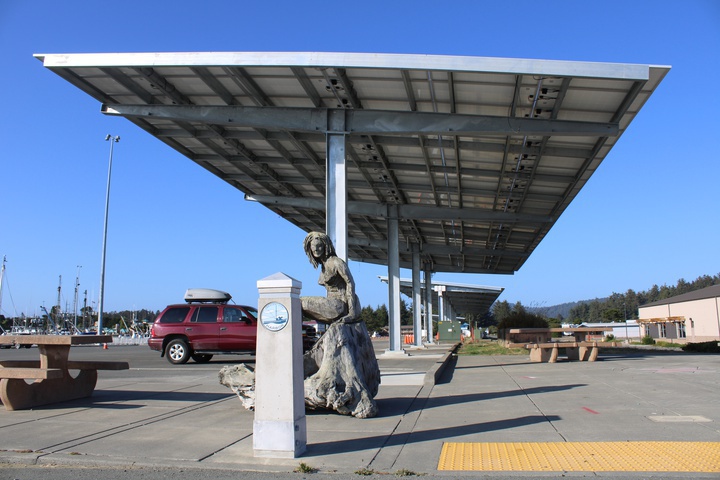Jessica Cejnar Andrews / Wednesday, Sept. 22, 2021 @ 4:02 p.m. / Local Government
Harbor District's Solar Panels Saved Port $8,000 From Feb. Through June, Is Accruing Credit With Pacific Power, Developer Says

The solar panel system at the Crescent City Harbor has saved the port about $8,000 in its electricity costs. File photo: Jessica C. Andrews
The Crescent City Harbor District has saved nearly $8,000 in electricity costs between February and June as a result of switching over to solar energy.
According to a presentation from Harbormaster Tim Petrick on Tuesday, the port’s rooftop solar panels and its solar canopy system produced 365,154 kilowatt hours of electricity between February and June.
Petrick also compared the costs from producing that solar power versus what the Harbor District would have paid in electricity bills to Pacific Power during those five months. According to him, the Harbor District would have paid $60,889.43 to the utility that serves Del Norte County between February and June. Instead, it’s costing the port $52,947.34 to produce that electricity, according to Petrick.
“I believe our power rates for PP&L will go up long before our solar costs go up,” he told commissioners.
However, one of the meters that the project’s developer, Florida-based Renewable Energy Capital, used in its net metering agreement with Pacific Power is continuing to prove a challenge, REC CEO Alex Lemus told commissioners.
Because that meter, which typically powers a cold storage facility during Dungeness crab season, isn’t in use, the harbor is accruing credits as a result of that energy production, Lemus said. Pacific Power is struggling where to apply those credits, he said.
“What it’s really going to take to straighten that out is to get that meter back to its previous levels and then it’ll all net out and it’ll be very simple and straight forward,” Lemus said. “That is why they make you size your system to a percentage of your load and unfortunately as soon as we turned it on, is when the No. 9 meter was shut off for all intents and purposes.”
REC owns the 156 kilowatt rooftop solar panel system and 420 kilowatt solar canopy system that were installed in June 2020 and began producing electricity last autumn. The Crescent City Harbor District had entered into a power purchase agreement with REC in 2017 with the goal of saving about $35,000 annually on its electricity payments.
In February 2018, commissioners met with American Diversified Energy of Costa Mesa, which would finance, build and maintain the solar power system. But in October 2019 — after the ADE representatives that had worked with port staff were no longer with the company — the harbor district put a lien on the solar panels, using them as leverage for ADE or REC to finish the project.
Toward the end of 2019, Lemus paid the lien and apologized to the Harbor District. Both parties negotiated a new power purchase agreement.
ADE hasn’t received any payments as a result of the $52,000 in credit the port has received, Lemus told commissioners Tuesday.
On Tuesday, Lemus said he and his staff went through each meter at the Crescent City Harbor, looking at usage, before submitting its net metering agreement to Pacific Power. He said he focused on the most expensive meter and those with the most usage so he could “maximize dollar savings.”
The Harbor District still saved on its electricity bill, Lemus said, but it was less than he anticipated because it’s not using its expensive meters.
“The savings will increase as you increase the usage of the No. 9 meter,” he said.
Harbor Commissioner Rick Shepherd, who is also president of the Crescent City Commercial Fisherman’s Marketing Association, said the cold storage units that meter was powering will be taken offline during the summer months. He said those freezers will probably turned on in November in preparation for the upcoming crab season this year and will be shut down again in July.
CLICK TO MANAGE